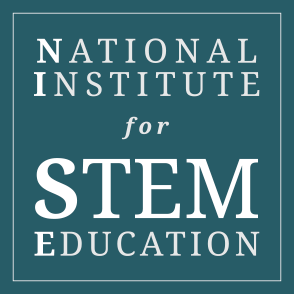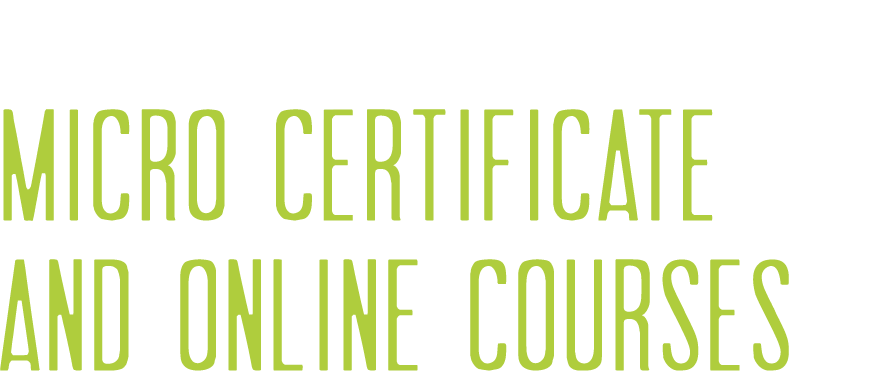Get Recognized, Advance Your STEM Teaching Skills
NISE Micro Certificates and online courses are a unique professional development opportunity designed to meet educators' needs for "just on time," highly targeted professional development. Three hours long and $39 per course, each 5E online course can be completed at your leisure. Take two courses in a strand to earn a verified digital badge to add your to portfolio and distinguish yourself as a STEM educator.
Teaching Online Essentials Certificate
Learn how to use evidence-based, hands-on strategies for teaching online with NISE’s Teaching Online “Essentials” Certificate.
Earn your Teaching Online “Essentials” Certificate by completing the four Micro Certificates listed below, each including two, 3-hour, online courses. You may also choose to complete any individual Micro Certificate or pick individual courses to refine your practice and learn new strategies for teaching online - in addition to onsite.
Micro Certificate
Establishing the Virtual Classroom
| Getting Started | |
|---|---|
|
Explore four foundational elements of successful online learning: routines, teaching presence, assessment, and the organization of learning. Teachers demonstrate their learning by developing a personalized action plan that addresses each of these fundamental components of successful online learning. |
|
| Advanced Practices | |
|---|---|
|
Strengthen instruction by exploring four advanced practices: synchronous learning, continual improvement, human elements, and online teaching standards. Teachers demonstrate their learning by developing a personalized action plan that addresses the four advanced practices. |
|
Micro Certificate
Building Community in the Virtual Classroom
| Getting Started | |
|---|---|
|
Explore four topics related to the community of inquiry framework: the framework, social presence, cognitive presence, and teaching presence. Teachers demonstrate their learning in this course by developing a personalized action plan that addresses each of these four topics. |
|
| Advanced Practices | |
|---|---|
|
Examine the following: meaningful context, synchronous and asynchronous collaboration, hands-on inquiry, and evidence-based explanations. Teachers demonstrate their learning by developing a personalized action plan that addresses each of the four advanced practices. |
|
Micro Certificate
Achieving 21st Century Outcomes in the Virtual Classroom
| Getting Started | |
|---|---|
|
Examine four types of learning outcomes: workforce needs, 21st-century skills, content area needs, and safe online practices. Teachers demonstrate their learning by developing a personalized action plan that addresses each set of learning outcomes. |
|
| Advanced Practices | |
|---|---|
|
Explore strategies to support deep understanding of learning outcomes through relevant real-world connections using virtual field trips and tours, careers and current events, home and community, and technology standards. Teachers demonstrate their learning by developing a personalized action plan that addresses each of the four advanced practices. |
|
Micro Certificate
Implementing Meaningful Assessment in the Virtual Classroom
| Getting Started | |
|---|---|
|
Explore how to embed assessment practices in the virtual classroom through four strategies: formative tools, summative data, feedback on student work, and feedback on students’ behaviors and processes. Teachers demonstrate their learning by developing a personalized action plan that addresses each of the four areas. |
|
| Advanced Practices | |
|---|---|
|
Examine the following online assessment practices: learning artifacts, presentations to authentic audiences, capacity matrices, and metacognitive strategies. Teachers demonstrate their learning by developing a personalized action plan that addresses each of these four advanced practices. |
|
STEM Essentials Certificate
The STEM Essentials Certificate represents an understanding and application of 12 specific highly effective instructional strategies that are essential to creating and sustaining STEM learning. This certificate requires the completion of six Micro Certificates listed below. You can also complete any of the individual micro certificates, or pick any single course, to refine your practice and learn new strategies.
This Essentials Certificate is appropriate for educators of all grade levels and content areas.
Micro Certificate
SCIENTIFIC ARGUMENTATION
| Argumentation | |
|---|---|
|
Learn protocols that help students positively and productively develop, analyze, critique, and defend arguments. Create a customized tool to develop appropriate goals for your students’ use of argumentation while outlining strategies to accomplish these goals. |
|
| Claim-Evidence-Reasoning | |
|---|---|
|
Examine current understanding and implementation of the Claim-Evidence-Reasoning (C-E-R) framework and develop practical. classroom tools and resources. Develop a customized tool for integrating C-E-R into instruction across content areas. |
|
Micro Certificate
SCIENTIFIC INQUIRY
| 5E Instructional Model | |
|---|---|
|
Learn how to design lessons that pique student interest while developing conceptual understanding through hands-on exploration. Develop a standards-aligned lesson using the 5E model, which can be applied in the development of learning experiences across content areas. |
|
| Scientific Investigations | |
|---|---|
|
Examine why “doing” science is essential to ”learning” science. Learn how to refine existing classroom materials and resources so higher degrees of inquiry may be achieved. Create a planning tool that facilitates the development of standards-aligned, inquiry-based investigations. |
|
Micro Certificate
SCIENTIFIC INNOVATION
| Engineering Solutions | |
|---|---|
|
Explore the role of the Engineering Design Process (EDP) to address real-world problems while learning how to realistically integrate the EDP into your classroom instruction and develop students’ mastery in its use. Create a customized tool for planning instruction with the EDP. |
|
| Technology Integration | |
|---|---|
|
Learn how to embed various technological tools and instructional strategies into your lessons to increase student engagement and learning. Develop a customized tool for planning technology-integrated, standards-aligned lessons. |
|
Micro Certificate
SCIENTIFIC COLLABORATION
| Cooperative Learning | |
|---|---|
|
Examine current implementation of cooperative learning in classrooms as a means of increasing students’ future success in post-secondary careers. Develop a customized tool to plan for the purposeful teaching of social skills, protocols, and tools for collaboration in the classroom. |
|
| Project-Based Learning | |
|---|---|
|
Learn the student, classroom, and teacher characteristics that are essential to the effective implementation of Project-Based Learning (PBL) and make targeted decisions about which of those need to be addressed to achieve student success. Develop a customized PBL plan using a seven-step process. |
|
Micro Certificate
SCIENTIFIC THINKING
| Questioning Strategies | |
|---|---|
|
Explore several educational taxonomies and questioning techniques that will foster students’ critical thinking and lead to more productive classroom discussions. Develop a personalized planning tool that focuses on developing multi-leveled questions and intentionally selecting discussion formats aligned to grade-level standards to stimulate students’ thinking and participation in robust discourse. |
|
| Addressing Misconceptions | |
|---|---|
|
Examine how to intentionally plan for instruction that uses probing questions to identify and understand students’ misconceptions while fostering their skills to begin identifying their own misunderstandings. Create a customized tool for addressing student misconceptions. |
|
Micro Certificate
SCIENTIFIC LITERACY
| Reading in STEM | |
|---|---|
|
Explore how to use primary and secondary text resources with students while implementing a variety of comprehension strategies aligned to varying purposes for reading. Develop a customized tool to support the use of reading resources for STEM learning. |
|
| Writing in STEM | |
|---|---|
|
Learn how to use a variety of writing strategies to help K-12 students become better writers of informational text. Create a customized planning tool to support writing integration across subjects. |
|
Other Online Courses
STEMscopes NGSS ESSENTIALS
| Maximizing STEMscopes NGSS Curriculum | |
|---|---|
|
Learn how to make the most of your NGSS STEMscopes curriculum with practical advice for lesson planning and classroom instruction. Develop a customized planning tool with a clear and thorough way to organize your instruction using STEMscopes resources. |
|
STEMscopes ESSENTIALS
| Maximizing STEMscopes Curriculum | |
|---|---|
|
Learn how to make the most of your STEMscopes curriculum with some very practical advice for lesson planning and classroom instruction. Develop a customized planning tool with a clear and thorough way to organize your instruction using STEMscopes resources. |
|
STEM CLASSROOM
| Always Time for Science | |
|---|---|
|
Explore how to find more time to maximize science learning when time is an obstacle. Examine a wide variety of strategies to increase science learning at school, home, and throughout the community. Develop a customized plan for increasing science learning for your students. |
|
NGSS ESSENTIALS
| Understanding NGSS | |
|---|---|
|
Examine the philosophical underpinnings and features of the Next Generation Science Standards (NGSS), and how to maximize student learning through effective planning and instruction with NGSS. Create or refine a planning tool to support NGSS standards-aligned instruction. |
|
Free Portfolio
NISE’s free STEM portfolio is the ideal place to showcase your STEM teaching awards and recognitions. Each Micro Certificate you earn will appear on your STEM portfolio, validating your efforts and commitment to improving your STEM teaching craft; furthermore, your STEM portfolio earns you recognition as an NISE graduate, engendering a connection between you and fellow NISE alumni to continue to grow personally and professionally. Digital badges from your portfolio can also be added to your email signature line, LinkedIn, and resume to distinguish yourself among fellow educators.



